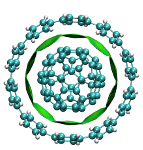HPC User Report from S. Frühwald (Chair of Theoretical Chemistry)
DFT investigation of CPP-fullerene and WF3/o-IDTBR
Structure, stability and fragmentation behavior of host-guest complexes of cycloparaphenyls with C60, C70, and C84 fullerenes have been analyzed by DFT.
The electron donor-acceptor system WF3/o-IDTBR was investigated to gain insight from DFT on a fast hole transfer between these molecules.
Motivation and problem definition
[10]- and [12]Cycloparaphenyl fullerene monomers and oligomers were analyzed by mass spectrometry by T. Drewello et al. To improve the understanding of the stability of these complexes and their fragmentation behavior, DFT methods were applied.
In the WF3 / o-IDTBR system a fast hole transfer was measured by C. Brabec et al. As these systems are tested for application in solar technology, accurate insight on these processes is of special importance.
Methods and codes
 Density-functional Theory (DFT), solving the Kohn-Sham equations self-consistently to gain insight on structure, energetics and excitation properties of the selected molecular systems.
Density-functional Theory (DFT), solving the Kohn-Sham equations self-consistently to gain insight on structure, energetics and excitation properties of the selected molecular systems.
TURBOMOLE 7.1-7.2 was used for single-node calculations on RRZE’s Woodcrest and LiMa cluster.
Results
Structures for various CPP fullerene complexes have been determined. The fragmentation behavior from mass spectrometry could be confirmed, the positive charge is kept on the CPP as the HOMO of the complex is localized on the CPP and the negative charge is kept on the fullerene as it is the better electron acceptor.
For the interacting WF3 / o-IDTBR system frontier molecular orbitals were obtained which are localized on both molecules. Because of similar HOMO energies of WF3 and o-IDTBR this interaction is possible. Excitations occur only from both interacting occupied orbitals, which further indicates the hole transfer between these orbitals.
Outreach
- M.Minameyer, S.Frühwald, Y.Xu, M.von Delius, A.Görling, T.Drewello: Gas-phase Investigations of Cycloparaphenylenes and their Ring-in-Ring/Fullerene Complexes; in preparation.
- S.Frühwald, N.Gasparini, C.Brabec, A.Görling: Density-functional investigation of the electron donor-acceptor systems WF3 / o-IDTBR and WF3 / PC70 BM; Poster at SolTech Conference Munich 4.10. – 5.10.2017.
Both projects are part of SFB 953: “Synthetic Carbon Allotropes”.
Researcher’s Bio and Affiliation
Stefan Frühwald is a PhD student in the group of Prof. Görling at the chair of Theoretical Chemistry. Research interests are Density-functional Theory investigations of molecules relevant for energy conversion and storage.
